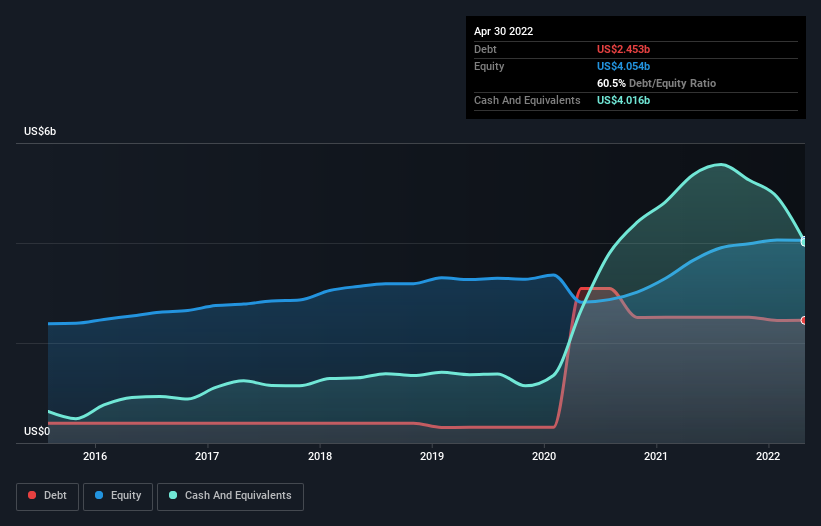Ross Stores (NASDAQ:ROST) Could Easily Take On More Debt
Some say volatility, rather than debt, is the best way to think about risk as an investor, but Warren Buffett famously said that 'Volatility is far from synonymous with risk.' It's only natural to consider a company's balance sheet when you examine how risky it is, since debt is often involved when a business collapses. As with many other companies Ross Stores, Inc. (NASDAQ:ROST) makes use of debt. But the real question is whether this debt is making the company risky.
When Is Debt A Problem?
Debt assists a business until the business has trouble paying it off, either with new capital or with free cash flow. Ultimately, if the company can't fulfill its legal obligations to repay debt, shareholders could walk away with nothing. However, a more frequent (but still costly) occurrence is where a company must issue shares at bargain-basement prices, permanently diluting shareholders, just to shore up its balance sheet. By replacing dilution, though, debt can be an extremely good tool for businesses that need capital to invest in growth at high rates of return. When we think about a company's use of debt, we first look at cash and debt together.
See our latest analysis for Ross Stores
How Much Debt Does Ross Stores Carry?
The chart below, which you can click on for greater detail, shows that Ross Stores had US$2.45b in debt in April 2022; about the same as the year before. However, its balance sheet shows it holds US$4.02b in cash, so it actually has US$1.56b net cash.
A Look At Ross Stores' Liabilities
According to the last reported balance sheet, Ross Stores had liabilities of US$3.76b due within 12 months, and liabilities of US$5.42b due beyond 12 months. Offsetting these obligations, it had cash of US$4.02b as well as receivables valued at US$164.1m due within 12 months. So its liabilities outweigh the sum of its cash and (near-term) receivables by US$5.00b.
Since publicly traded Ross Stores shares are worth a very impressive total of US$26.2b, it seems unlikely that this level of liabilities would be a major threat. However, we do think it is worth keeping an eye on its balance sheet strength, as it may change over time. Despite its noteworthy liabilities, Ross Stores boasts net cash, so it's fair to say it does not have a heavy debt load!
On top of that, Ross Stores grew its EBIT by 42% over the last twelve months, and that growth will make it easier to handle its debt. The balance sheet is clearly the area to focus on when you are analysing debt. But ultimately the future profitability of the business will decide if Ross Stores can strengthen its balance sheet over time. So if you want to see what the professionals think, you might find this free report on analyst profit forecasts to be interesting.
Finally, a company can only pay off debt with cold hard cash, not accounting profits. Ross Stores may have net cash on the balance sheet, but it is still interesting to look at how well the business converts its earnings before interest and tax (EBIT) to free cash flow, because that will influence both its need for, and its capacity to manage debt. Over the most recent three years, Ross Stores recorded free cash flow worth 77% of its EBIT, which is around normal, given free cash flow excludes interest and tax. This cold hard cash means it can reduce its debt when it wants to.
Summing up
Although Ross Stores's balance sheet isn't particularly strong, due to the total liabilities, it is clearly positive to see that it has net cash of US$1.56b. And we liked the look of last year's 42% year-on-year EBIT growth. So is Ross Stores's debt a risk? It doesn't seem so to us. The balance sheet is clearly the area to focus on when you are analysing debt. However, not all investment risk resides within the balance sheet - far from it. For instance, we've identified 4 warning signs for Ross Stores (1 is concerning) you should be aware of.
Of course, if you're the type of investor who prefers buying stocks without the burden of debt, then don't hesitate to discover our exclusive list of net cash growth stocks, today.
Have feedback on this article? Concerned about the content? Get in touch with us directly. Alternatively, email editorial-team (at) simplywallst.com.
This article by Simply Wall St is general in nature. We provide commentary based on historical data and analyst forecasts only using an unbiased methodology and our articles are not intended to be financial advice. It does not constitute a recommendation to buy or sell any stock, and does not take account of your objectives, or your financial situation. We aim to bring you long-term focused analysis driven by fundamental data. Note that our analysis may not factor in the latest price-sensitive company announcements or qualitative material. Simply Wall St has no position in any stocks mentioned.

 Yahoo Finance
Yahoo Finance 
